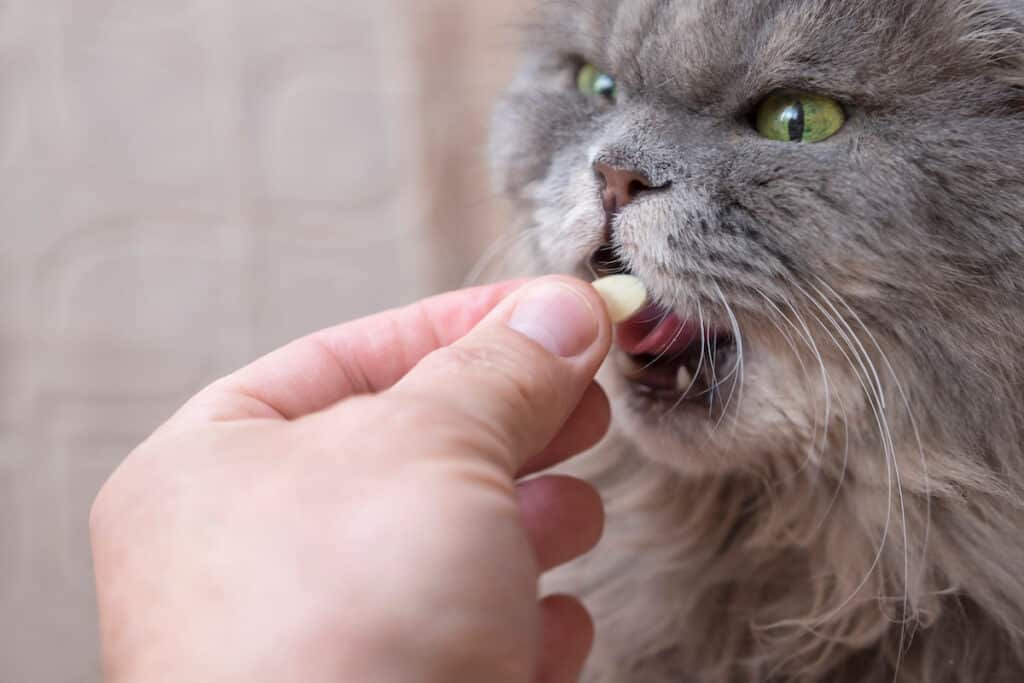Vitamin B is essential in the overall health of your cat. There are actually several B vitamins that make up the entire B vitamin complex. This article will go through all aspects of vitamin B for cats to help you make the best decisions for the health of your cat.
B vitamins are important in immune function, brain function, fat and protein metabolism, vision, hair, growth and development, pregnancy and stress management.
Some owners choose to supplement vitamin B for cats into their cat’s diet using liquids, powers or pills. You can also include more B vitamins through certain foods in your cat’s diet.
Why Do Cats Need Vitamin B?
There are actually several B vitamins that make up the B vitamin complex. Each plays a slightly different, but important role in your cat’s health. In general, the B vitamins are involved in the immune system, brain, fat and protein metabolism, vision, hair appearance, growth and development, pregnancy and lactation, and stress management.
All B vitamins are water-soluble, meaning they can dissolve in water. This is important because it means it’s really hard for your cat to overdose on B vitamins. They can simply excrete the amounts they don’t need.
Here is a list of the B vitamins and what they do:
- Vitamin B1 or thiamine: maintain the health of the nervous system and increases appetite.
- Vitamin B2 or riboflavin: is important for vision and for the health of the cat’s coat.
- Vitamin B3 or niacin: also improves appetite and facilitates digestion.
- Vitamin B5 or pantothenic acid: helps in fat metabolism.
- Vitamin B6 or pyridoxine: is a needed vitamin for protein metabolism.
- Vitamin B8 or biotin: is responsible for maintenance of the hair and facilitates the metabolism of fats, carbohydrates, and proteins.
- Vitamin B9 or folic acid: prevents fetal deformities, being essential during pregnancy and in the formation of new cells.
- Vitamin B12 or cobalamin: is involved in the formation of blood cells, such as red blood cells or erythrocytes. Many vets recommend supplementing vitamin B6 because it’s so important.
As you can see, vitamin B is involved in all areas of your cat’s health. Making sure your cat is getting all their B vitamins is an essential part of care.
Where is Vitamin B Found?
You cat should be able to meet all of their vitamin B needs through food. Most cat foods, including wet food and dry food contains added vitamin B. If you choose to make your own cat food at home, make sure some of the following foods are being included. Some foods that include vitamin B are:
- Liver (B1, B5, B9)
- Eggs (B2, B3, B12)
- Chicken (B3, B5, B6, B12)
- Beef (B3, B5, B12)
- Pork (B3, B6, B12)
- Fish (B3, B6, B12)
- Wheat Flour (B3)
- Kidneys (B5)
- Bananas (B6)
Note that preparing raw cat food diets take special consideration and care. You will need to buy only high quality meats that have been grass-fed and free-range. The meat will also need to be prepared in a very sanitary facility.
Vitamin B Supplements
If you suspect your cat isn’t getting enough B vitamins, or you’re making your own cat food at home, you may need to give your cat vitamin B supplements. Vitamin B supplements for cats come in liquid, soft chew, powder and tablet formats. There isn’t necessarily one best vitamin B supplement form. The most important factor is whether or not your cat will eat the supplement. For instance, some picky cats will work best with liquid vitamin B supplements because you can mix it into their food.
In addition, you can purchase vitamin B supplements separately by B vitamin or buy them as a complex. For example, if you only need vitamin B12, you can get supplements with only that in it. Likewise, if you want all the B vitamins, you can get a B vitamin complex supplement.
Finally, some cat owners choose to just buy regular vitamin B supplements meant for people. While this is generally ok, you need to make sure the supplement doesn’t have any additives that won’t be good for your cat. You’ll also need to calculate dosages for your cat as the dosage on the bottle will be for people.
How Much Vitamin B Does My Cat Need Every Day?
The dose of vitamin B will change depending on the type of supplement. For example, you’ll administer different amounts of vitamin B powder vs. liquid.
In general, you’ll either give your cat a vitamin B complex or just vitamin B12. It’s rare that a cat needs any of the other B vitamins separately.
Always follow the recommended doses given on the container of the supplements. But just to give you an idea of daily vitamin B does, here are some examples:
- Liquid B12 – 0.5 ml per day
- Tablet B12 – 500 micrograms per day
- Liquid vitamin B complex – 2 ml per day
Signs of Vitamin B Deficiency in Your Cat
You cat will show different symptoms depending on the type of vitamin B deficiency. For example, vitamin B6 deficiency will look different than vitamin B12 deficiency. Some of these symptoms are signs you need to take your cat to the vet. Never try to diagnose and medicate your cat. Only a vet will have the proper resources to test and verify vitamin deficiencies.
Signs of Vitamin B1 deficiency
- Anorexia
- Vomiting
- Nerve problems including dilated pupils, impaired vision
- Seizures
- Tremors
Signs of Vitamin B2 deficiency
- Weight loss
- Anorexia
- Cataracts
Signs of Vitamin B5 deficiency
- Delayed growth
- Skin deformities
- Increased tissue scarring
Signs of Vitamin B6 deficiency
- Delayed growth
- Anemia
- Fatigue and lethargy
Signs of Vitamin B9 deficiency
- Anemia
- Fatigue and lethargy
- Weight loss
Signs of Vitamin B12 deficiency
- Fatigue and lethargy
- Weight loss
- Vomiting
- Diarrhea














